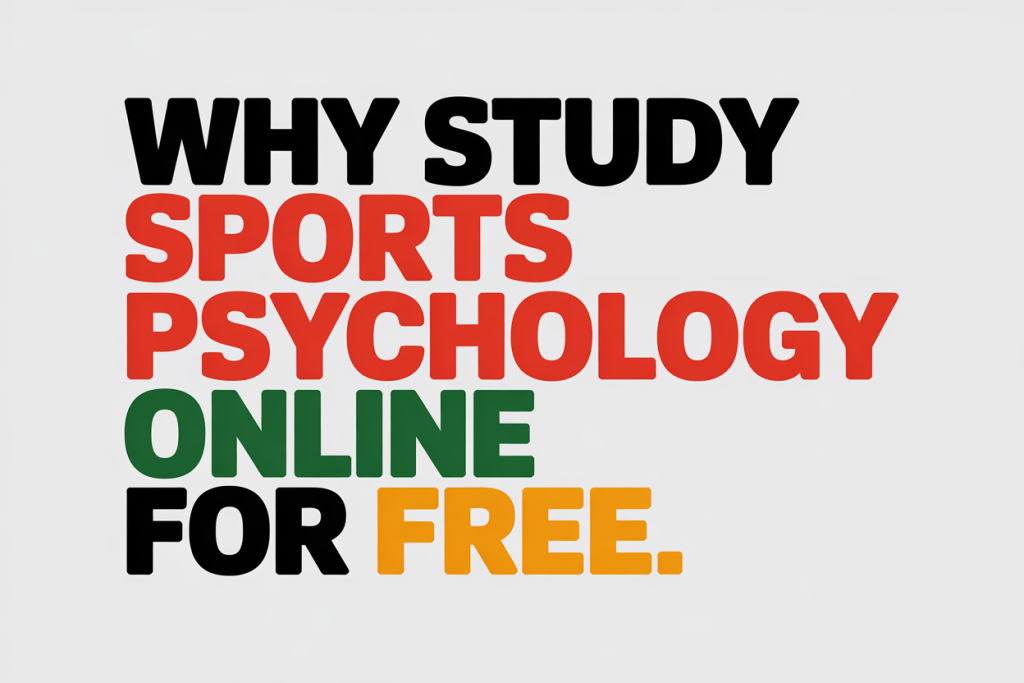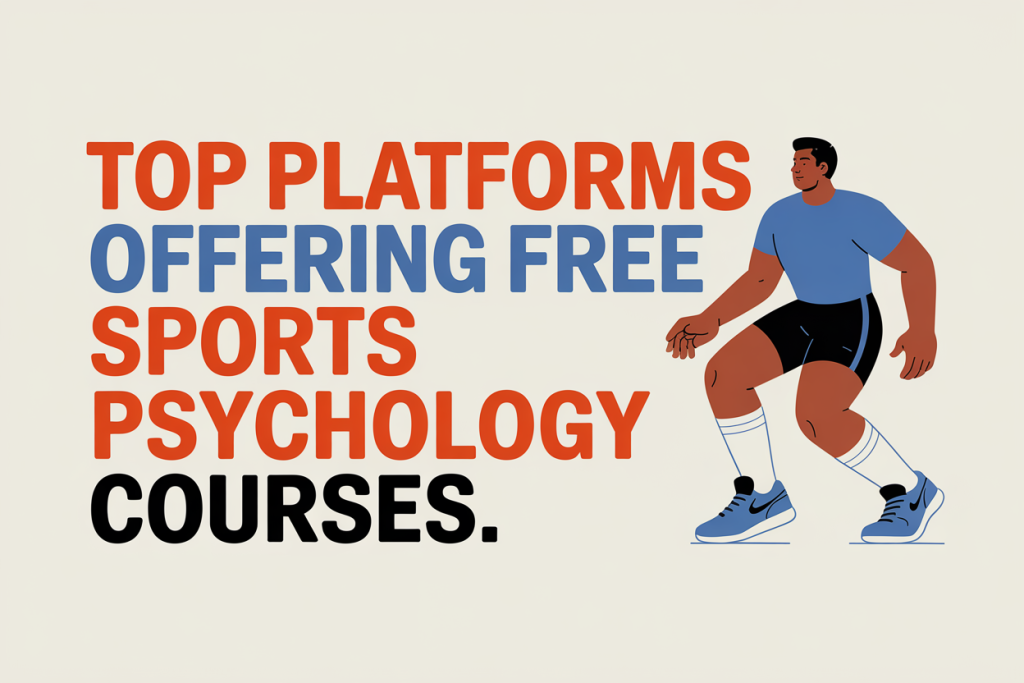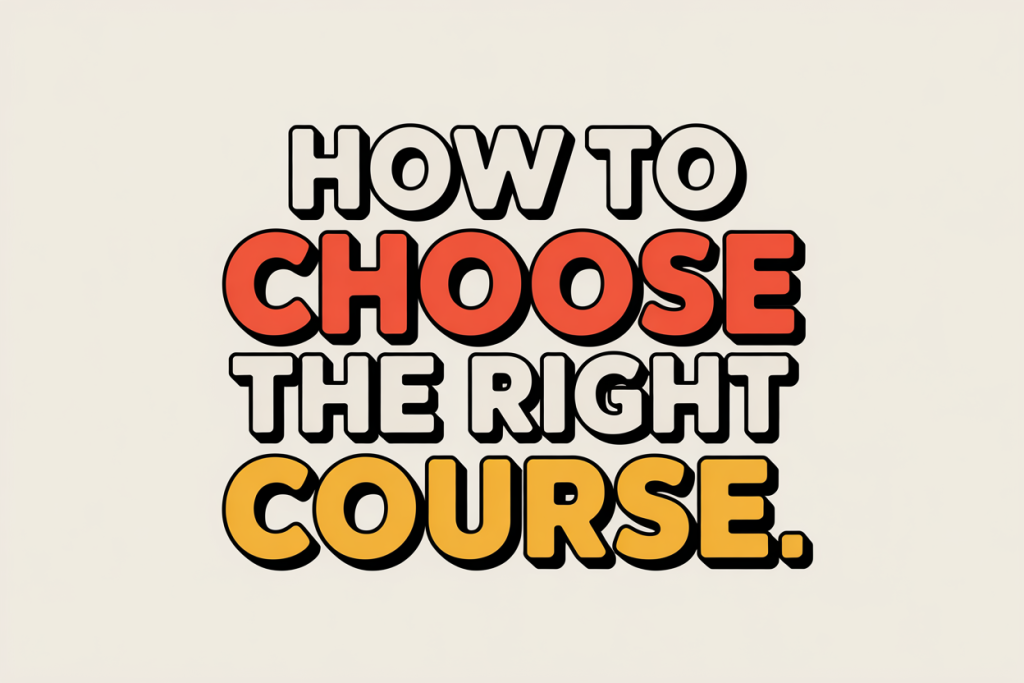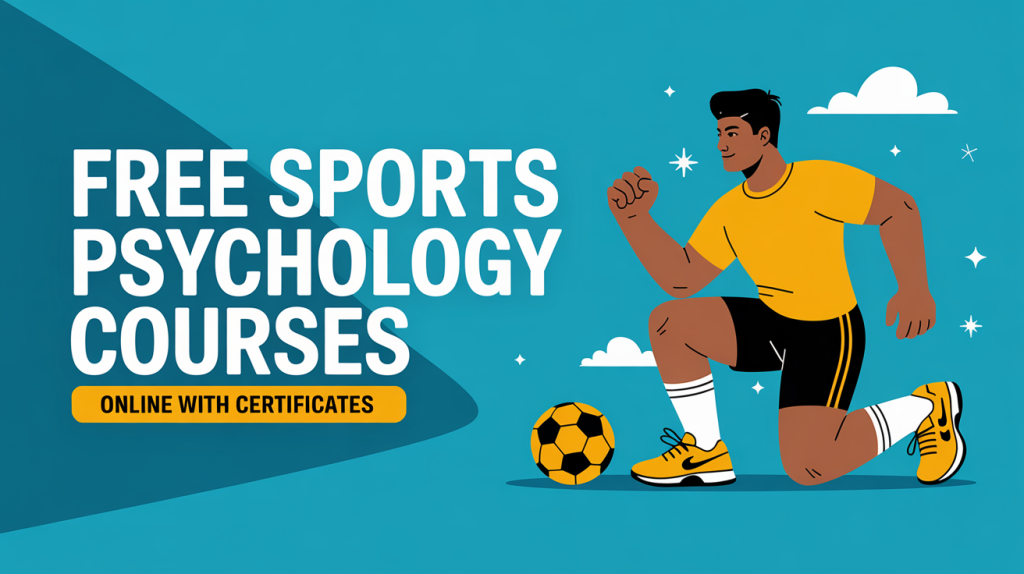You can study sports psychology online for free through trusted platforms like Coursera, edX, Alison, and YouTube. These beginner-friendly courses help you learn mental training techniques, motivation strategies, and performance psychology—all at zero cost.
Want to learn how athletes stay mentally strong under pressure? Curious how psychology boosts performance in sports? You’re not alone. Many coaches, students, and fitness lovers are searching for free, flexible ways to explore this exciting field—without paying tuition fees or enrolling in college.
The good news? You don’t need a psychology degree to get started. There are free online courses designed for beginners that break down the basics in clear, simple lessons. Whether you want to level up your coaching, train smarter as an athlete, or just explore a new interest, this guide will show you exactly where to start.
Let’s walk through the top platforms, what each course offers, and how to choose the best free option for your goals.
What Is Sports Psychology?
Definition and Importance
Sports psychology is the study of how the mind affects athletic performance and physical activity. It focuses on mental factors like motivation, confidence, focus, and emotional control. These factors can often mean the difference between winning and losing.
In sports, mental strength is just as important as physical ability. Athletes may face stress, fear of failure, or pressure during competition. Sports psychology helps them manage these feelings and perform at their best. It also supports long-term growth, recovery from injury, and healthy team dynamics.
Even outside of professional sports, these principles apply. Coaches, trainers, and even casual athletes benefit from learning how the brain and body work together. That’s why this field is growing in schools, teams, and wellness programs worldwide.
According to the American Psychological Association, sports psychologists also help with goal-setting, visualization, and dealing with burnout. It’s a practical science that supports better outcomes both on and off the field.
Applications in Sports and Fitness
You don’t need to be a pro athlete to apply sports psychology. It’s used across fitness training, coaching, team sports, and personal development.
For example, a runner might use goal-setting and visualization to prepare for a marathon. A coach may use motivation techniques to keep the team focused. A fitness instructor can apply stress-reduction methods to help clients stay consistent with workouts.
Common applications include:
- Building mental toughness during tough games or training sessions
- Improving focus and attention in high-pressure situations
- Creating positive routines to boost confidence
- Managing nerves before a competition or performance
- Supporting injury recovery through positive thinking and patience
This field combines psychology, sports science, and personal performance. That’s why it’s useful for athletes, coaches, teachers, and everyday fitness lovers alike.
Why Study Sports Psychology Online for Free?

Benefits of Online Learning
Free online courses make learning accessible to anyone, anywhere. If you’re curious about sports psychology but don’t want to pay for a full college program, these courses are the perfect place to begin.
Here are some key benefits:
- Study at your own pace: Learn when it fits your schedule, whether that’s during a lunch break or on weekends.
- No cost to get started: Many platforms offer full course access without charging a fee.
- Beginner-friendly content: Courses are often designed with no prior experience required.
- Learn from trusted sources: Some courses are created by top universities or certified professionals.
Platforms like Coursera, edX, and Alison offer real lessons from real experts. You’ll learn the same topics taught in professional degree programs, but in a more flexible way.
Online learning also means you can replay lessons, pause to take notes, and go back to topics you didn’t fully understand. That’s a big win, especially for people who learn best at their own speed.
Who Should Take These Courses?
Anyone with an interest in how the mind affects sports can benefit from free online sports psychology courses.
Aspiring sports psychologists often start with these courses to explore the field before applying to a degree program. Coaches use them to gain insight into how to motivate players and improve team performance. Athletes—from beginners to pros—learn tools to stay focused, build resilience, and sharpen their mental game.
These courses are also a great fit for:
- Fitness trainers who want to better understand client behavior
- PE teachers looking to add psychology to their lessons
- Parents of young athletes who want to support their child’s mental well-being
Whether you’re hoping to build a career or just boost your mental performance, these free courses are a smart starting point.
Top Platforms Offering Free Sports Psychology Courses

Coursera (Free Audit Option)
Coursera works with top schools like Stanford, Duke, and Yale to provide professional courses online. Many of these can be taken for free by selecting the “Audit” option at checkout.
For example, the course “The Science of Well-Being” by Yale University offers insights into motivation, mindset, and habits—skills that are deeply connected to sports performance. Another course, “Mindshift: Break Through Obstacles to Learning and Discover Your Hidden Potential” by McMaster University, focuses on mental blocks and overcoming performance anxiety.
You can choose to pay for a certificate, but it’s optional. Auditing the course still gives you access to all the lectures and reading materials.
edX
Like Coursera, edX features courses from top universities like Harvard, MIT, and University of Queensland. You can enroll in most classes for free and choose to buy a certificate if needed.
One standout option is the course “The Psychology of Performance”, which explores how mental tools improve outcomes in both sports and everyday life. Topics include focus, confidence, and managing emotions under pressure.
edX courses often include:
- High-quality video lectures
- Quizzes to check your understanding
- Peer discussion forums
These make it easier to stay engaged and track your progress.
FutureLearn
FutureLearn is a UK-based platform that offers short, free courses with a strong community focus. While not as widely known as Coursera or edX, it has excellent options in the health and wellness space.
Their “Sport Psychology for Coaches” course is a popular pick. It teaches the basics of sports psychology, including how to support athlete development and manage motivation. Lessons are interactive and often include case studies or practical exercises.
FutureLearn also has an active comment section where learners share tips and ask questions. It feels more like a classroom—and that can help you stay motivated.
Alison
Alison offers 100% free courses with optional paid certificates. Its “Diploma in Sports and Psychology” is great for anyone who wants a fast yet deep introduction to the topic.
This course covers:
- Performance anxiety
- Goal setting
- Coaching principles
- Athlete behavior
All lessons are self-paced, and there’s a final assessment at the end. If you score 80% or higher, you’ll earn a free digital certificate. This can be useful if you’re building a coaching portfolio or applying for new roles in fitness.
YouTube Educational Channels
Don’t underestimate YouTube. There are many high-quality sports psychology playlists made by coaches, universities, and sports psychologists.
Top channels include:
- Human Kinetics – Features quick lessons on motivation and focus
- APA PsycTopics – Covers mental health topics for athletes
- Sport Psych Works – Real-world strategies for athletes and teams
Because it’s free and easy to use, YouTube is ideal for visual learners who prefer short videos over long courses. Just be sure to choose content from verified or expert-backed sources.
Course Features and What to Expect
Topics Covered
Most free sports psychology courses start with simple ideas that are easy to understand. You’ll learn how the brain and body work together in sports. One major topic is mental skills training—this includes things like focus, goal-setting, and self-talk. These skills help athletes stay calm and perform under pressure.
You’ll also study motivation, both for teams and individuals. This is key for coaches and athletes who want to improve daily effort and long-term success. Some courses include lessons on emotional regulation, which teaches you how to control fear, nerves, or frustration during competition.
Other common topics include:
- Confidence building for performance
- Visualization techniques for success
- Group dynamics and team cohesion
- Injury recovery and mindset support
These lessons are helpful in many sports settings—from youth leagues to pro teams. Even fitness instructors and gym coaches use them to support client goals.
You can read more about these areas in the APA Division 47: Society for Sport, Exercise & Performance Psychology, which covers research and practice in this field.
Duration and Format
Most courses are short and easy to follow. You don’t need to set aside hours each day. Many learners finish a full course in just 2 to 6 weeks. Platforms like Coursera and edX let you work at your own pace, while FutureLearn follows a weekly schedule.
Lessons often include:
- Short video lectures (5–15 minutes)
- Reading materials
- Quizzes or quick reviews
- Discussion boards or peer support (in some courses)
Some platforms give you access for life. Others have limits unless you pay for a certificate. But if you’re only there to learn for free, you’ll still get the full course content.
Learning formats are usually video-based, which helps you see real-life examples. Many courses include stories from coaches, athletes, or real-world research studies.
Certificate Options (Free vs Paid)
Certificates can be useful if you want to show your progress. But not all platforms offer free certificates. Some, like Alison, give you a free digital certificate if you pass the final quiz with a high score.
Other platforms, such as Coursera or edX, require payment if you want a certificate—even if the course itself is free. This is known as the audit model: you can learn everything for free but won’t get proof unless you upgrade.
Here’s how to decide:
- Learning for personal interest? Stick with free versions.
- Want to add it to your resume or LinkedIn? Consider buying a certificate.
- Need official credit for a job or study program? Look for accredited options.
You can learn more about free certificate courses at trusted sources like Class Central, which lists thousands of free and paid options.
Best Free Courses Compared
| Course Title | Platform | Duration | Free Certificate | Best For |
| Introduction to Sport Psychology | Coursera (via University of Toronto) | 4 weeks | No (Audit Only) | Beginners and students |
| The Psychology of High Performance | edX (offered by University of Queensland) | 6 weeks | No (Upgrade for certificate) | Athletes, coaches |
| Diploma in Sports and Psychology | Alison | 2–3 hours | Yes | Fast learners, fitness coaches |
| Mental Training for Athletes | YouTube (Human Kinetics) | Varies | N/A | Visual learners, busy schedules |
Each course has strengths. Coursera and edX are backed by top schools. Alison is short, easy to finish, and includes a free certificate. YouTube offers free tips without formal lessons.
Tip: Try a short course first. If you enjoy it, you can move on to more advanced topics or paid programs later.
How to Choose the Right Course

Based on Your Goals
The best course for you depends on what you want to achieve. If you’re just curious about how mindset affects sports, start with a basic introductory course. These give you a quick overview and teach you key skills like focus and confidence.
If you’re a coach, look for a course that covers leadership and motivation. Some even teach how to work with different types of athletes, which can improve team results. For athletes, pick a course that includes performance routines, pre-game mental prep, and visualization.
Here’s a simple breakdown:
- For beginners: Coursera’s free audit courses
- For coaches: FutureLearn’s “Sport Psychology for Coaches”
- For quick learners: Alison’s diploma track
- For flexible learners: YouTube-based tutorials
Choosing based on your goals saves time and helps you apply what you learn right away.
Accredited vs Non-Accredited Options
An accredited course is one that is officially recognized by a school, college, or professional body. These courses often lead to diplomas or credits that count toward a larger program. They’re ideal if you plan to become a licensed sports psychologist in the future.
On the other hand, non-accredited courses (like most free ones) are more casual. They still teach useful skills but don’t carry the same official weight. That’s fine for many learners, especially if your main goal is personal growth or better coaching.
To check if a course is accredited:
- Look for partnerships with universities (like Yale, Stanford, or Harvard)
- See if the certificate mentions CPD, CEU, or college credits
- Visit the course info page and read the fine print
You can also check OpenLearn or FutureLearn’s partners to see who created the course.
If you need official credit, you may have to invest in a paid or degree-level course later. But free options are a smart first step—and they can help you decide if this field is right for you.
Career Paths After Studying Sports Psychology
Coaching and Training
Many people who study sports psychology online go on to become coaches or trainers. These roles let you use what you’ve learned right away. You’ll help athletes stay focused, build better habits, and grow stronger mentally.
If you’re already a coach, free courses can improve how you motivate your team, handle pressure situations, and create better mental routines. These skills are useful in all kinds of sports—from youth leagues to adult fitness groups.
Some courses also include real-life coaching strategies, like how to give feedback or run mental warm-ups. These tools help you connect better with players and get stronger results. If you’re looking to earn a coaching certificate, learning psychology can give you an edge when applying.
The National Federation of State High School Associations (NFHS) offers many professional courses that combine coaching and psychology topics. Though not all are free, they’re trusted across the U.S.
Sports Therapy and Counseling
If you want to work more deeply with athletes, you might explore sports therapy or performance counseling. These careers often require a degree and license, but free online courses are a helpful first step.
Therapists in this field help athletes deal with stress, injury recovery, or mental blocks. They often work in clinics, schools, or with pro teams. Counselors might also teach breathing techniques, mental imagery, and ways to manage fear or low mood.
To go this route, you’ll likely need a bachelor’s or master’s in psychology, plus clinical training. But exploring the topic through free courses can help you decide if it’s the right career for you.
You can learn more about training and certification at the Association for Applied Sport Psychology (AASP), which lists education paths and credentials.
Further Academic Study
Free online courses can also help you prepare for college-level study. Many learners use them to explore the field before choosing a degree or diploma. Some even use these courses to boost their application or resume.
If you plan to become a certified sports psychologist, you’ll need advanced education. That includes a bachelor’s in psychology, followed by a graduate degree and a license to practice. However, these early online courses teach the core ideas in a simple way.
Platforms like OpenLearn, FutureLearn, and Coursera offer entry-level courses from universities. These can lead to professional certificates or even credit toward a full degree. You can also check APA’s guide to psychology careers for more on long-term paths.
Online learning makes it easy to explore your interests without pressure. That’s why it’s a smart first move if you’re not sure whether to commit to a full program yet.
Frequently Asked Questions
Is a certificate from a free course valid?
Free course certificates can be a helpful addition to your resume or LinkedIn profile. They show that you took the time to learn something new. However, they are usually not accredited or approved by major licensing bodies.
If you need proof for a job or want school credit, you may need to choose a paid certificate or formal diploma. Still, free certificates are useful for personal growth, freelance work, or entry-level roles in sports or fitness.
Many platforms clearly mark whether their certificates are verified. Alison offers free digital certificates with course completion, while Coursera and edX require payment to unlock official ones.
Can I become a sports psychologist with free online courses?
Free courses are a great starting point, but they don’t replace a full degree or license. To become a licensed sports psychologist, you need a master’s or doctoral degree, plus state licensure or certification.
That said, many students use free courses to explore the field first. This can help you build interest, practice key skills, and prepare for future academic work. It’s also a smart way to see if this career fits your goals.
For full details, visit the APA’s career pathways or AASP’s certification roadmap.
Are these courses suitable for beginners?
Yes. Most free sports psychology courses online are made for beginners. They don’t require prior knowledge, and they explain terms in a simple way. Many include short videos, quizzes, and real-life examples that help you understand how psychology works in sports.
If you’re brand-new to the topic, start with a course that says “introductory” or “beginner-friendly” in the description. You can always move on to more advanced courses later if you enjoy the content.
What’s the difference between free and paid courses?
The main difference is usually the certificate. Free courses let you learn everything at no cost, but you may not get a certificate unless you upgrade. Paid courses also sometimes offer graded assignments, teacher feedback, or career support.
If you’re learning for fun or just exploring the topic, a free course is often enough. If you want to build your resume or use it for work, it might be worth paying for the extras.
Websites like Class Central or MOOC List let you compare course features before you enroll.
Final Thoughts: Is It Worth Taking Free Sports Psychology Courses?
Absolutely. If you’re curious about sports psychology, these courses give you an easy, flexible way to learn. You’ll understand how the mind affects performance, how to stay focused, and how to support athletes at any level.
Whether you’re an athlete, a coach, a teacher, or just someone who wants to grow mentally stronger, these free online courses offer real value. You don’t need a degree to get started. And you don’t need to spend money to learn something new.
Start small, try a beginner course, and see where it leads. You may find that this is just the beginning of a bigger journey—whether it’s in coaching, sports therapy, or advanced study.


